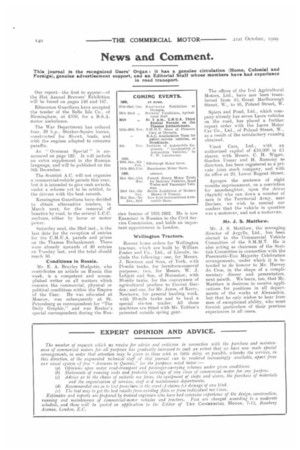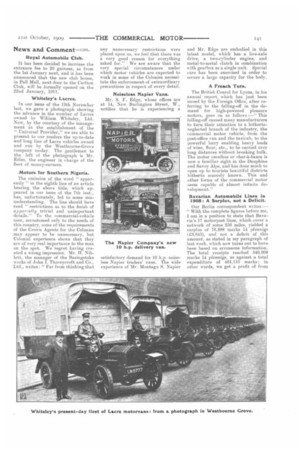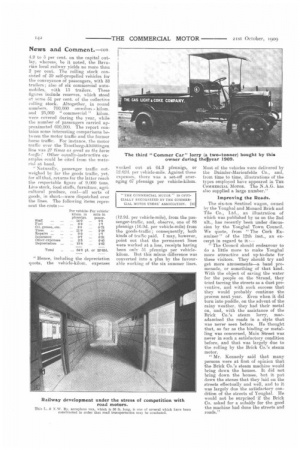News and Comment.
Page 10

Page 11

Page 12

If you've noticed an error in this article please click here to report it so we can fix it.
This journal is the recognized Users Organ : it has a genuine circulation (Home, Colonial and Foreign), genuine advertisement support, and an Editorial Stall whose members have had experience in road transport.
Our report— the first to appear—of the 31st Annual Brewers' Exhibition will be found on pages 146 and 147.
Edmonton Guardians have accepted the tender of the Belle Isle Co., of Birmingham, at £550, for a B.S.A. motor ambulance.
The War Department has ordered lour, 28 hp., Straker-Squire lorries. constructed for 30-cwt. loads, and with the engines adapted to consume paraffin.
An " Overseas Special " is announced on page 132. It will include an extra supplement in tho Russian language, and will be published on the '9th December.
The Scottish A.C. will not organize a commercial-vehicle parade this year, hut it is intended to give cash awards, under a scheme yet to be settled, to the drivers with the best records.
Kensington Guardians have decided to obtain alternative tenders, in March next, for the removal of lunatics by road, to the several L.C.C. asylums, either by horse or motor power.
Saturday next, the 23rd inst., is the last date for the reception of entries for the C.M.U.A. parade and prizes on the Thames Embankment. There were already upwards of 30 entries on Tuesday last, and the total should reach 50.
Conditions in Russia.
Mr. E. A. Bravley Hodgetts, who 'contributes an article on Russia this week, is a competent and accomplished writer on all matters which 'concern the commercial, physical or political conditions within the Empire of the Czar. He was educated at Moscow, was subsequently at St. Petersburg as correspondent for "The Daily Graphic," and was Reuters special correspondent during the R us Sian famine of 1891-1892. He is now Examiner in Russian to the Civil Service Commission, and holds an important appointment in London.
Wellington Tractors.
Recent home orders for Wellington tractors, which are built by William Foster and Co., Ltd., of Lincoln, include the following one, for Messrs. J. Bowman and Sons, of York, with 25-mile tanks. for furniture-removal purposes; two, for Messrs. W. 5. Lobjoit and Son, of Hounslow, with 30-mile tanks, for the conveyance of agricultural produce to Covent Garden ; and one, for Mr. Jones, of Kerry, Newtown, for general hauling work, with 20-mile tanks and to haul a special six-ton trailer. All these machines are fitted with Mr. Tritton's patented mitside spring gear. The offices of the Ivel Agricultural Motors, Ltd., have now been transferred from 45, Great Marlborough Street, W., to 46, Poland Street, W.
Spiers and Pond, Ltd., which company already has seven Lacre vehicles on the road, has placed a further repeat order with the Lacre Motor Car Co., Ltd., of Poland Street, W., as a result of the satisfactory running obtained.
Vinot Cars, Ltd., with an authorized capital of £10,000 in la shares, with Messrs. C. H. Wigan, Gordon Usmar and H. Ramoisy as directors, has been registered as a private joint stock company, and with its office at 20, Lower Regent Street.
Apropos the sentence of eight months imprisonment, on a conviction for manslaughter, upon the driver (Saytch) who ran down a number of men in the Territorial Army, near Devizes, we wish, to remind our readers that the vehicle in question was a motorcar, and not a motorvan_ Mr. J. S. Matthew.
Mr. .1. S. Matthew, the managing director of Argylls, Ltd., has been elected to the Commercial Vehicle Committee of the S.M.M.T. He is also acting as chairman of the Scottish Committee in connection with the Pneumatic-Tire Majority Celebration arrangements, under which it is intended to do honour to Mr. Harvey du Cros, in the shape of a complimentary dinner and presentation, next month. We learn, too, that Mr. Matthew is desirous to receive applications for positions in all departments of the works at Alexandria, but that he only wishes to hear from men of exceptional ability, who must furnish particulars of their previous experiences in all cases.
Royal Automobile Club.
It has been decided to increase the entrance fee to 20 guineas, as from the 1st January next, and it. has been announced that the new club house, in Pall Mall, next door to the Carlton Club, will be formally opened on the 22nd January, 1911.
Whiteley's Lacres.
In our issue of the 12th November last, we gave a photograph showing the advance in the number of Lacres owned by William Whiteley, Ltd. Now, by the courtesy of the management at the establishment of the " Universal Provider," we are able to present to our readers the up-to-date and long line of Leers vehicles owned and run by the Westbourne-Grove company to-day. The gentleman to the left of the photograph is Mr. Ediss, the engineer in (large of the fleet of money-earners, ,Motors for Southern Nigeria.
The omission of the word "apparently "in the eighth line of an article bearing the above title, which appeared in our issue of the 7th inst., has, unfortunately, led to some misunderstanding. The line should have read " restrictions as to the finish of appartntly trivial and unimportant details." To the commercial-vehicle user, accustomed only to the needs of this country, some of the requirements of the Crown Agents for the Colonies may appear to he unnecessary, but Colonial experience shows that they are of very real importance to the man on the spot. We regret having created a wrong impression. Mr. H. Niblett, the manager of the Basingstolce works of John I. Thornycroft and Co., Ltd., writes : " Far from thinking that
any unnecessary restrictions were placed upon us, we feel that there was a very good reason for everything asked for." We are aware that the very special circumstances under which motor vehicles are expected to work in some of the Colonies necessitate the enforcement of extraordinary precautions in respect of every detail.
Noiseless Napier Vans.
Mr. S. F. Edge, whose offices are at 14, New Burlington Street, W., notifies that he is experiencing a satisfactory demand for 10 h.p. noiseless Napier traders' vans. The wide experience of Mr. Montagu S. Napier and Mr. Edge are embodied in this latest model, which has a live-axle drive, a two-cylinder engine, and metal-to-metal clutch in combination with gearbox as a single unit. Special care has been exercised in order to secure a large capacity for the body.
A French Turn.
The British Consul for Lyons, in his annual report, which has just been issued by the Foreign Office, after referring to the falling-off in the demand for high-powered pleasure motors, goes on as follows :—" This falling-off caused many manufacturers to turn their attention to a hithertoneglected branch of the industry, the commercial motor vehicle, from the post-office van and the taxicab, to the powerful lorry enabling heavy loads of wine, flour, etc., to be carried over long distances without breaking bulk. The motor omnibus or char-k-bancs is now a familiar sight in the Dauphine and Savoy Alps, and has done much to open up to tourists beautiful districts hitherto scarcely known. This and other forms of the commercial motor seem capable of almost infinite development."
Bavarian Automobile Lines in 1908: A Surplus, not a Deficit.
Our Berlin correspondent writes:— " With the complete figures before me, I am in a position to state that Bavaria's 17 motorpoat lines, which cover a network of some 256 miles, yielded a surplus of 76,888 marks 14 pfennigs
£3,845), and not a deficit of this amount, as stated in my paragraph of last week, which now turns out to have been based on erroneous information. The total receipts reached 540,998 marks 14 pfennigs, as against a total expenditure of 464,110 marks ; in other words, we get a profit of from
4.9 to 5 per cent. on the capital outlay, whereas, be it noted, the Bavarian local railway yields no more than 2 per cent. The rolling stock consisted of 59 self-propelled vehicles for the conveyance of passengers, with 33 trailers; also of six commercial automobiles, with 15 trailers. These figures include reserves, which stood at some 51 per cent, of the collective rolling stock. Altogether, in round numbers, 700,000 (minibus kilom. and 25,000 " commercial " kilom. were covered during the year, while the number of passengers carried approximated 600,000. The report contains some interesting comparisons between the motor traffic and the former horse traffic. For instance, the motor traffic over the Trostberg-Altottingen line was 27 times as great as the horse traffic! Other equally-instructive examples could be cited from the material at hand.
Naturally, passenger traffic outweighed by far the goods traffic, yet, for all that, returns for the latter reach the respectable figure of 9,000 tons. Live stock, food stuffs, furniture, agricultural produce, coal—all sorts of goods, in short—were dispatched over the lines. The following items represent the costs:—
worked out at 64.3 pfennigs, or 12.62d. per vehicle-mile. Against these expenses, there was a set-off averaging 67 pfennigs per vehicle-kilom.
(12.9d. per vehicle-mile), from the passenger-traffic, and, observe, one of 88 pfennigs (16.9d. per vehicle-mile) from the goods-traffic; consequently, both kinds of traffic paid. I may, however, point out that the permanent lines were worked at a loss, receipts having been only 51 pfennigs per vehicleIdiom. But this minus difference was converted into a plus by the favourable working of the six summer lines.
Most of the vehicles were delivered by the Daimler-Marienfelde Co., and, from time to time illustrations of the types employed have appeared in TIM COMMERCIAL MOTOR, The N.A.G. haa also supplied a large number."
Improving the Roads.
The six-ton Sentinel wagon, owned by the Youghal and Monard Brick and Tile Co., Ltd., an illustration of which was published by us on the 2nd ult., has recently been under discussion by the Youghal Town Council. We quote, from " The Cork Examiner" of the 12th inst., an excerpt in regard to it:— " The Council should endeavour to do a little more to make Youghal more attractive and up-to-date for these visitors. They should try and get more amusements—a band promenade, or something of that kind. With the object of saving the water for the people on the Strand, they tried tarring the streets as a dust preventive, and with such success that they would probably continue the process next year. Even when it did turn into puddle, on the advent of the rainy weather, they had their metal on, and, with the assistance of the Brick Co.'s steam lorry, macadamised the roads in a style that was never seen before. He thought that, so far as the binding or metalling was concerned, Main Street was never in such a satisfactory condition before, and that was largely due to the rolling by the Brick Co.'s steam motor.
"Mr. Kennedy said that many persons were at first of opinion that the Brick Co.'s steam machine would bring down the houses. It did not bring down the houses, but it put down the stones that they laid on the streets effectually and well, and to it was largely due the satisfactory condition of the streets of Youghal. He would not be surprised if the Brick Co. asked for a subsidy for the good the machine had done the streets and roads."






















